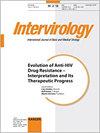Evaluation of Rapid, Molecular-Based Assays for the Detection of Respiratory Syncytial Virus
IF 3.2
4区 医学
Q3 VIROLOGY
引用次数: 4
Abstract
Objective: Respiratory syncytial virus (RSV) infection causes lower respiratory tract infection primarily in infants and toddlers. RSV reinfection also occurs throughout life and can be a significant cause of pneumonia and mortality in the elderly. Surges in physician offices, emergency department visits, and hospitalization often result from RSV illness. Point-of-care (POC) testing reduces healthcare costs and permits informed decisions on treatment, further testing, or hospitalization to occur during the physician-patient encounter. Optimal POC assays must be sensitive, easy to perform, and provide rapid results. Methods: In this study, 2 POC assays (Alere i; Abbot Rapid Diagnostics and cobas Liat, Roche Molecular, Inc.) and a laboratory-based assay (Solana; Quidel, Inc.) were evaluated using 133 patient nasopharyngeal specimens. Results: Sensitivity/specificity values (%) of 94.7/96.1, 98.2/96.1, and 96.5/94.7 were obtained for the Alere i, Liat, and Solana assays, respectfully. These values approximated those stated in each assay’s package insert. Conclusion: Rapid molecular assays for RSV are sensitive and accurate. The choice of assay should reflect each healthcare institution’s specific testing needs with respect to the benefits and drawbacks of each product.呼吸道合胞病毒快速分子检测方法的评价
目的:呼吸道合胞病毒(RSV)感染主要导致婴幼儿下呼吸道感染。呼吸道合胞病毒再次感染也会在一生中发生,可能是老年人肺炎和死亡的重要原因。医生办公室的外科医生、急诊科就诊和住院治疗通常是由呼吸道合胞病毒疾病引起的。护理点(POC)检测降低了医疗成本,并允许在医患接触期间就治疗、进一步检测或住院做出明智的决定。最佳的POC测定必须灵敏、易于执行并提供快速结果。方法:在本研究中,使用133例患者鼻咽标本评估了2种POC测定(Alere i;Abbot Rapid Diagnostics和cobas Liat,Roche Molecular,股份有限公司)和一种基于实验室的测定(Solana;Quidel,股份有限公司)。结果:Alere i、Liat和Solana测定的敏感性/特异性分别为94.7/96.1、98.2/96.1和96.5/94.7。这些值近似于每个分析包插入中所述的值。结论:RSV快速分子检测方法灵敏、准确。化验的选择应反映每个医疗机构对每种产品的优缺点的具体检测需求。
本文章由计算机程序翻译,如有差异,请以英文原文为准。
求助全文
约1分钟内获得全文
求助全文
来源期刊

Intervirology
医学-病毒学
CiteScore
5.40
自引率
0.00%
发文量
13
审稿时长
6-12 weeks
期刊介绍:
''Intervirology'' covers progress in both basic and clinical virus research, and aims to provide a forum for the various disciplines within virology. Issues publishing original papers alternate with thematic issues, focusing on clearly defined topics. This thematic concentration serves to make timely reviews, research reports and controversy easily accessible to both specialists in the field and those who want to keep track of the latest developments outside their own area of interest. In addition to original papers, regular issues publish short communications and letters to the editor to provide readers with a forum for the exchange of ideas and comments. The scope encompasses work on the molecular biology of human and animal viruses, including genome organization and regulation, and the structure and function of viral proteins. The pathogenesis, immunology, diagnosis, epidemiology, prophylaxis and therapy of viral diseases are considered.
 求助内容:
求助内容: 应助结果提醒方式:
应助结果提醒方式:


